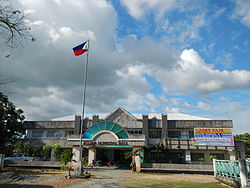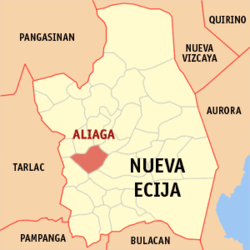Aliaga, Nueva Ecija
| Aliaga | ||
|---|---|---|
| Municipality | ||

Aliaga Municipal Hall
|
||
|
||
 Map of Nueva Ecija showing the location of Aliaga |
||
| Location within the Philippines | ||
| Coordinates: 15°30′0″N 120°50′38″E / 15.50000°N 120.84389°ECoordinates: 15°30′0″N 120°50′38″E / 15.50000°N 120.84389°E | ||
| Country | Philippines | |
| Region | Central Luzon (Region III) | |
| Province | Nueva Ecija | |
| District | 1st District | |
| Barangays | 26 | |
| Government | ||
| • Mayor | Elizabeth Roman Vargas | |
| Area | ||
| • Total | 90.04 km2 (34.76 sq mi) | |
| Population (2015) | ||
| • Total | 63,543 | |
| • Density | 710/km2 (1,800/sq mi) | |
| Time zone | PST (UTC+8) | |
| ZIP code | 3111 | |
| IDD : area code | +63 (0)44 | |
| Income class | 2nd class; rural | |
Aliaga is a second class municipality in the province of Nueva Ecija, Philippines, Formerly it was called Pulung Bibit and Maynilang Munti (Little Manila). The First mayor is Aneceto Pere. According to the 2015 census, it has a population of 63,543 people.
It has a comparatively cool and healthful climate, and is situated about midway between the Pampanga Grande and the Pampanga Chico rivers, in a large and fertile valley. Historically, the principal products were mostly agricultural such as rice, tomato, eggplant, squash.
Tagalog and Ilocano are the most important and the major languages of the municipality.
Aliaga is politically subdivided into 26 barangays.
The Taong Putik Festival is an annual feast held every 24 June. It is a religious festival celebrated by the locals and devotees to pay homage to San Juan Bautista on his feast day by wearing costumes patterned to his attire. The taong putik (Filipino term) soak themselves in mud and cover their body with dried banana leaves and visit houses or ask people for alms in a form of candle or money to buy candles which they offer for Saint John the Baptist to celebrate his feast day.
...
Wikipedia


